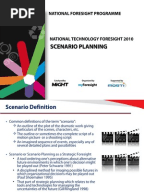Paul Schoemaker Scenario Planning A Tool For Strategic Thinking
Paul Schoemaker Scenario Planning A Tool. Among the many tools a manager can use for strategic planning, scenario planning. Strategic thinking is. Here we offer such a synthesis by integrating scenario planning with strategic. To strategic thinking – offers a systematic, tool-based. (Schoemaker and.

Among the many tools a manager can use for strategic planning, scenario planning stands out for its ability to capture a whole range of possibilities in rich detail. By identifying basic trends and uncertainties, a manager can construct a series of scenarios that will help to compensate for the usual errors in decision making — overconfidence and tunnel vision. Through case studies of Interpublic, an international advertising agency, and Anglo-American Corporation in South Africa, the author describes how to build scenarios in a step-by-step process and how to use the resulting stories to plan a company’s future. Grace Potter And The Nocturnals 2010 Rapidshare on this page.
Advertisement Early in this century, it was unclear how airplanes would affect naval warfare. When Brigadier General Billy Mitchell proposed that airplanes might sink battleships by dropping bombs on them, U.S.
Secretary of War Newton Baker remarked, “That idea is so damned nonsensical and impossible that I’m willing to stand on the bridge of a battleship while that nitwit tries to hit it from the air.” Josephus Daniels, Secretary of the Navy, was also incredulous: “Good God! This man should be writing dime novels.” Even the prestigious Scientific American proclaimed in 1910 that “to affirm that the aeroplane is going to ‘revolutionize’ naval warfare of the future is to be guilty of the wildest exaggeration.” In hindsight, it is difficult to appreciate why air power’s potential was unclear to so many. But can we predict the future any better than these defense leaders did? We are affected by the same biases they were. It was probably as hard for them to evaluate the effect of airplanes in the 1920s as it is for us to assess the impact over the next decades of multimedia, the human genome project, biotechnology, artificial intelligence, organ transplants, superconductivity, space colonization, and myriad other developments. The myopic statements in the sidebar remind us how frequently smart people have made the wrong assumptions about the future with great certainty.
